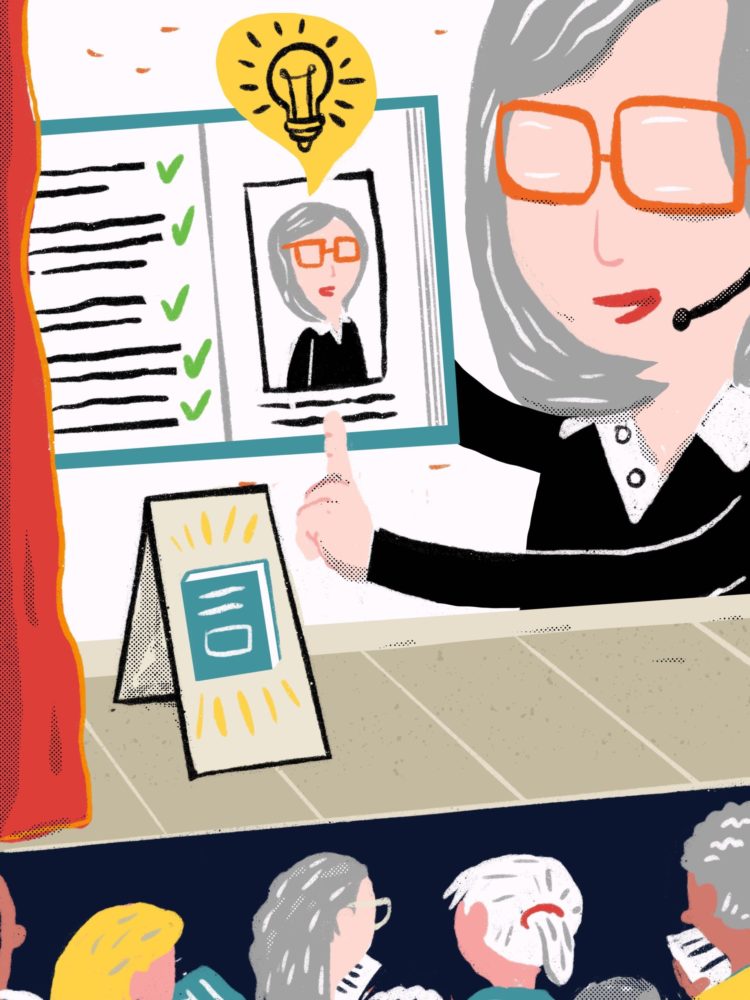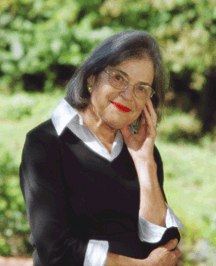I am now an expert on aging. Not because I just completed a PhD in Social and Behavioral Sciences—I didn’t—or because S.A.G. (the Society for the Advancement of Gerontology) sent out an all points I didn’t receive. It’s because as soon as my book was published, a collection of humorous essays called, How to Succeed at Aging Without Really Dying, I became an instant authority—after all, an octogenarian who’s written a book must have the real scoop on how to stretch out your life.

“Not to say being a recognized expert doesn’t have its advantages…” Illustration by Josh Quick
Interviews are a necessary evil for authors: established or newbie, if you write a book, you want to sell it, and the road to success is paved with as many interviews as you can get—real or virtual, online, on the radio or on TV. I thought the whimsical nature of my title, and what I thought of as the very light treatment of the subject would tip interviewers off. But they don’t let you choose the questions. I was invariably asked the question they ask anyone over 40: “to what do you attribute your longevity?” I could have answered, “Because I have always worn knee hi’s instead of panty hose,” or “I use my night cream as a day cream,” and they would have stroked their collective chins and said, “Mmmn, that makes sense.” Humor? Unimportant; it’s the expertness in me they’re interested in.
The same goes for bookstores. Totally ignoring the whimsy in my title, they took my book so seriously. It was usually found in the “Aging” Section. Just walk up the stairs, to the rear of the store, and look for the shelves with the black crepe lining. There you’ll see it along with such other fun books as Finishing Well: Aging And Reparation In The Intergenerational Family and The Practice of Concern: Ritual, Well-Being, and Aging in Rural Japan. Here again, the assumption is: if the title begins with “How to—“ the author obviously knows what she’s talking about. No kidding.
Never mind that I have no more idea about why people are living longer than the neighborhood cat. The fact that I sold my first book when I was 80 and saw it in print just after my 82nd birthday makes me not only an authority, but “an inspiration,” living proof you too can write a book if you drink a cup of green tea every day (I have mine with lunch), swim laps 3 times a week (well, most weeks), and try to do a double crostic every so often.
It pains me to think of all those women out there, content and healthy in their lives, who now feel their days are numbered because I, “the expert,” has spoken. Even my children, who never waited with bated breath to hear which vitamins I thought they should take, now listen intently when I describe the beneficial effects of bee pollen on the immune system. The fact that I have been dubbed an expert supersedes the fact that I am their mother, whose nutritional advice pre-book was not worth a hill of beans, organic or otherwise.
Having written a book with a catchy title and so effortlessly achieved “expert” status, I’m beginning to question the “expertness” of authors I see interviewed on TV. Did this guy write a book because he’s an expert on Middle Eastern affairs? Or is he an expert on Middle Eastern affairs because he wrote a book? If you think about it, anyone who writes a book can be dubbed an “expert,” and the more they write the more “expert” they become.
Not to say being a recognized expert doesn’t have its advantages—it certainly does. Before I became an author/expert, I might have been considered eccentric because I count the raisins I put on my cereal in the morning. When I mention this now, it’s considered another of my secret age-defying weapons, along with driving within speed limits and on the right side of the road, wearing shoes with a support insole, and never ever using soap on my face. Is that a life plan or what?
Ponce de Leon and I have a lot in common: neither one of us discovered the fountain of youth. But where we differ is in this: people know he didn’t find a secret fount but they think I did. So, who am I to disillusion my fellow seniors? If you want to view me as your aging guru, I’m cool with that. Just remember, only one thing makes your opinion less “expert” than mine. I wrote a book.
